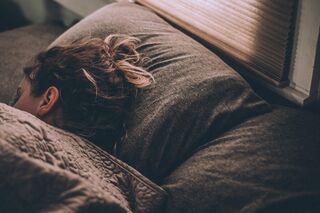Sleep
Can Sleep Become an Addiction?
Have you ever had a morning where you just didn’t want to get out of bed?
Posted April 27, 2022 Reviewed by Gary Drevitch

“All I want to do is stay in bed and sleep!”
Have you ever had a morning when you just didn’t want to get out of bed? Maybe you had a really nice dream that you weren’t ready to wake up from. Perhaps staying in the warm bed sounded much nicer than putting your feet on the cold floor. Or maybe you weren’t looking forward to the day, and just wanted a few more minutes of comfort. Everyone has had mornings like that.
For some people, though, relying on the comfort of sleep may become a compulsion—or even feel like an addiction. Sleep is a vital life process, but getting too much can be as bad as not getting enough. So, is sleep addiction really something we need to worry about?
No. Sleep addiction isn’t an actual condition. Unlike drug addiction or alcohol addiction, sleep doesn’t meet the criteria of addiction or substance use disorder. You may feel like you crave sleep, and you might even neglect personal relationships to sleep (one criterion of addiction), but that alone doesn’t approach the clinical diagnosis. Remember: Sleep is a necessary biological function you need to survive and be healthy. And while a rejuvenating night’s rest feels great, you can’t become addicted to it. However, if you feel like you’re “addicted” to sleep, or struggling to get enough rest, it could be a sign of another serious problem.
Feel Addicted to Sleeping? What May Be Causing It
Excessive daytime sleepiness is a major sign that something is wrong with your sleep. If your body is craving sleep, it’s a sign of sleep deprivation. Sleep deprivation can be caused by:
- Poor sleep habits, like eating or drinking alcohol too close to bedtime, too much screen time before bed, etc.
- An irregular sleep schedule, especially if you work graveyard shifts or at odd hours.
- Daytime behavior that could be sabotaging your sleep, like napping too late in the day.
Sleep disorders are another major cause of sleep deprivation. More specifically, some sleep disorders, known as hypersomnias, can contribute to excessive sleep and excessive daytime sleepiness. These include:
- Narcolepsy.
- Sleep apnea.
- Idiopathic hypersomnia.
- Kleine-Levin Syndrome, also known as Sleeping Beauty Syndrome.
- Dysania, an excessive desire to stay in bed—also known as sleep inertia.
Unfortunately, treating sleep deprivation isn’t as simple as just getting more sleep. You can’t just make up your sleep debt by getting a few extra hours the next night. So it’s important to know what signs to look out for if there’s an underlying disorder sabotaging your sleep.
Signs of Hypersomnia
It’s not easy to tell if you’re suffering from a hypersomnia. That’s because it’s impossible to self-diagnose what’s happening to you while you’re sleeping. When you wake up and feel the side effects in the morning, you can't be sure what the root of the problem is because you aren’t aware that anything happened.
Some signs of an undiagnosed hypersomnia include:
- Difficulty waking up after a long sleep and needing to nap during the day.
- Cognitive impairment like brain fog or memory problems.
- Irritability.
- Daytime fatigue.
What is Clinomania?
Like dysania, clinomania is a compulsion to stay in bed beyond your normal sleep schedule. However, like sleep addiction itself, neither is a diagnosable condition. Difficulty waking up after sleep and needing to nap during the day can be signs that you may not be getting the good quality sleep you need. Even if your sleep duration is just right—7 to 9 hours for most adults—poor sleep quality can make you feel like you just need more sleep to feel rested.
There may be other reasons that people struggle to leave the warmth and comfort of their beds—something much more personal.
Sleep Addiction and Mental Health
We’ve all had days when we just didn’t want to get out of bed. But sleep issues like struggling to get out of bed or feeling addicted to sleep can be a significant sign of mental health problems. Many people who suffer from mental health disorders like depression and anxiety find that they don’t get enough sleep, or that they can’t get out of bed in the morning. In fact, dependence on sleep can be a sign of depression.
Mental health problems are a lot to cope with. People with depression may gravitate toward their beds as a safe place where the negativity of the world can’t reach them. Then, when they sleep, they’re given further relief from that negativity.
Things to Try if You Can’t Sleep
Natural sleep aids have become very popular, and for good reason: They can work very well, without the negative effects of prescription sleep aids. Natural, non-habit-forming sleep aids you can use to help you return to the healthy sleep you deserve include melatonin, chamomile, valerian root, and lavender.
While sleep addiction isn’t an actual condition, the need to sleep beyond your normal amount can be a sign of more serious problems. If your excessive daytime sleepiness has become noticeable or is affecting your day-to-day life, talk to your doctor or a sleep specialist as soon as possible. They can help you get to the root of the issue and get the treatment you need to get a good night’s sleep.
Sweet Dreams,
Michael J. Breus, PhD, FAASM
The Sleep Doctor




